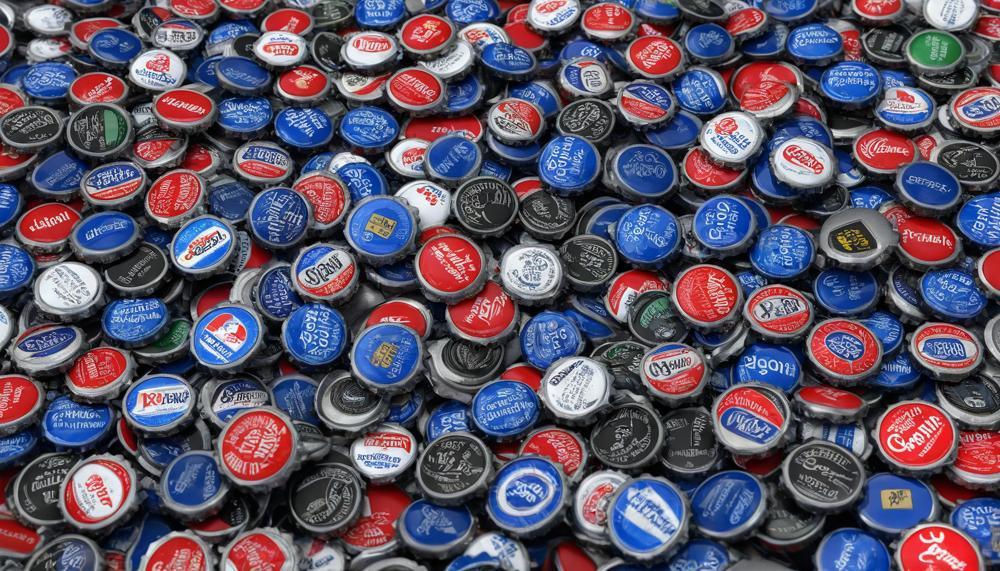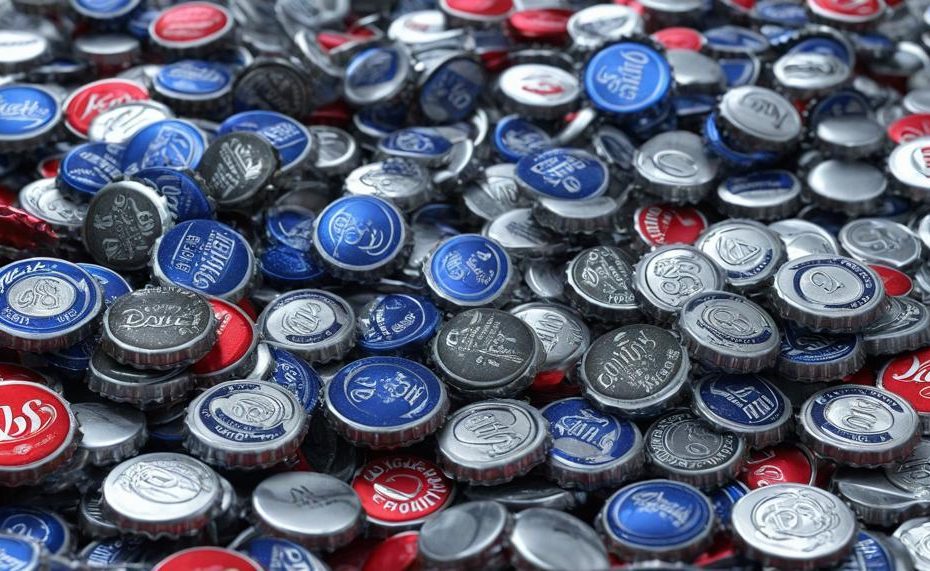Recycling metal bottle caps might seem like a small effort, but it has a big impact. These little pieces are usually made of aluminum or steel, known for their durability and resistance to rust. However, their tiny size often leads to challenges in the recycling process, causing contamination and increased costs. Despite these hurdles, recycling metal bottle caps is crucial for reducing waste, protecting wildlife, and minimizing plastic pollution.
Why is this important? Because when these caps end up in landfills, they can take hundreds of years to decompose, contributing to the growing problem of environmental pollution. Moreover, if they find their way into oceans and other habitats, they pose significant threats to wildlife. By taking the time to properly recycle metal bottle caps, you’re helping to ensure a cleaner, healthier planet.
Key Takeaways:
- Small Effort, Big Impact: Recycling metal bottle caps helps reduce environmental pollution and protects wildlife.
- Check Local Rules: Some recycling facilities may not accept metal caps due to their size. Always check with your local recycling center.
- Proper Preparation: Make sure bottle caps are clean and free of contaminants before recycling.
- Sort and Collect: Collecting metal caps in cans and sorting by type can make recycling easier and more effective.
- Specialist Options: If local facilities don’t accept metal caps, look for specialist recyclers or scrap yards that do.
Ready to make a difference? Let’s dive into the simple steps you can take to recycle those metal bottle caps effectively.
Contents
The Type of Bottle Cap
The short answer is that both steel and aluminium bottle caps can be recycled. Here’s a more detailed look at these types:
| Type of Metal Bottle Cap | Recycling Information | Special Instructions |
| Aluminium Caps | Aluminium caps are lightweight and resistant to corrosion. They are fully recyclable and can be melted down to create new products. | Ensure caps are clean and placed in a can before recycling to prevent them from getting lost during the sorting process. Learn more about aluminium recycling. |
| Steel Caps | Steel caps are durable and also recyclable. They can be magnetically separated from other materials during the recycling process. | Like aluminium, steel caps should be clean. Collecting them in a steel can helps ensure they are properly processed. Read about steel recycling. |
How to Recycle Plastic Bottle Caps
Properly recycling plastic bottle caps involves several key steps to ensure they are handled correctly and responsibly.
- Check Local Recycling Guidelines
Before recycling plastic bottle caps, verify your local recycling program’s rules. Each municipality may have different requirements regarding whether caps should be left on or removed.
| Step | Action | Details |
| 1.1 | Check local recycling guidelines | Consult your local recycling program’s website or contact them directly. |
- Separate Caps When Required
If instructed to do so, remove caps from bottles before recycling. Caps and bottles are often made from different types of plastics, which require separate processing.
| Step | Action | Details |
| 2.1 | Remove caps from bottles | Separate plastic caps from their corresponding bottles. |
- Clean the Caps
Ensure caps are free from any liquid or residue to avoid contamination in the recycling process. Rinse them thoroughly if needed.
| Step | Action | Details |
| 3.1 | Clean the caps | Rinse caps under running water to remove any residue. |
- Recycle Caps Separately or Together
Depending on local rules, you may need to recycle caps separately in a designated container or bag. Some programs allow caps to be placed back on empty, crushed bottles.
| Step | Action | Details |
| 4.1 | Recycle caps separately | Place clean caps in a separate recycling container or bag. |
| 4.2 | Leave caps on bottles | Reattach caps to empty, crushed bottles if permitted. |
- Alternative Disposal
If your local recycling program does not accept plastic caps, consider alternative disposal methods. Collect caps in a plastic bag before discarding to reduce environmental impact.
| Step | Action | Details |
| 5.1 | Collect caps in a plastic bag | Contain caps in a plastic bag before disposing of them. |
- Special Recycling Programs
Look for specialist recyclers or programs specifically designed to handle plastic bottle caps, such as schools or community initiatives.
| Step | Action | Details |
| 6.1 | Find specialist recyclers | Research local programs or organizations that accept plastic caps for recycling. |
Recycling plastic bottle caps properly reduces environmental pollution and helps conserve resources. Always follow your local recycling program’s guidelines to ensure proper disposal.
How to Recycle Metal Bottle Caps
Properly recycling metal bottle caps involves several steps to ensure they are disposed of correctly and contribute to sustainability.
Check Local Recycling Guidelines
Confirm with your local recycling facility if they accept metal bottle caps and follow any specific guidelines they provide. Some facilities might have special requirements for these small items.
Clean the Caps
Ensure the metal bottle caps are clean and free of any contaminants. This helps prevent contamination of other recyclables and ensures the caps can be processed efficiently.
Contain the Caps
To avoid losing small caps in the recycling process, collect them in a larger metal container, such as an aluminium can. Once the can is full, crimp the top to keep the caps inside and place it in the recycling bin.
No Liquid
Ensure no liquid remains in the caps. While rinsing isn’t necessary, make sure they are dry to prevent issues during transport and recycling.
Follow Recycling Instructions
Adhere to the specific instructions provided by your local recycling program to ensure the caps are processed correctly.
Importance of Recycling Metal Bottle Caps
Recycling metal bottle caps is crucial for several environmental and economic reasons.
Reduce Landfill Waste
Recycling keeps metal caps out of landfills, reducing the space needed for waste and lowering the environmental impact of waste management.
Conserve Resources
Recycling metal reduces the need for mining new materials, conserving natural resources and decreasing energy consumption associated with producing new metal.
Environmental Protection
Metal caps can take hundreds of years to decompose if not recycled. Proper recycling helps prevent pollution and protects wildlife, particularly marine life, from ingesting harmful materials.
Promote Sustainability
Recycled metal bottle caps can be transformed into new products such as steel beams, tools, or new aluminium cans. This cycle supports a more sustainable and circular economy.
Community Impact
Participating in recycling initiatives helps reduce the number of caps found in beach cleanups and public areas, contributing to cleaner and safer communities.
Why Should You Recycle Bottle Caps?
Recycling metal bottle caps offers numerous benefits and is crucial for environmental conservation and resource efficiency.
Benefits of Recycling Metal Bottle Caps

| Benefit | Description | Example |
| Reduces Plastic Waste | Recycling keeps metal caps out of the environment, protecting wildlife and reducing pollution. | Caps no longer littering beaches and oceans. |
| Saves Resources | Recycling conserves materials and reduces the need for new raw materials, saving energy. | Recycled caps can be made into new steel beams or car parts. |
| Economic Benefit | Recyclers can earn money by selling metal bottle caps to scrap yards. | Scrap yards pay for collected metal caps. |
| Minimizes Environmental Impact | Recycling helps reduce the ecological footprint of metal bottle caps, which take centuries to decompose. | Proper recycling prevents caps from contributing to microplastic pollution. |
| Prevents Recycling Contamination | Proper recycling prevents caps from contaminating other recyclable materials, which is resource-intensive to clean up. | Clean recycling processes are more efficient and cost-effective. |
| Supports Beach Cleanups | Recycling reduces the estimated 20 million bottle caps found on beaches annually. | Cleaner beaches, less marine debris. |
Importance of Recycling Metal Bottle Caps
- Environmental Impact: Metal bottle caps are among the top ten items found during beach cleanups, indicating their significant presence in marine litter. By recycling, we reduce this pollution.
- Longevity in Landfills: These caps take hundreds of years to decompose. In a landfill, they contribute to long-term waste problems.
- Microplastic Pollution: As metal bottle caps degrade slowly, they break down into microplastics, which are harmful to wildlife and ecosystems.
- Resource Efficiency: Recycling caps means less need for new raw materials, conserving natural resources and reducing energy consumption in production processes.
- Clear Recycling Practices: Properly recycling bottle caps avoids confusion and mixed messages about recycling, enhancing overall recycling efforts.
By recycling metal bottle caps, we contribute to a sustainable future, protect wildlife, and conserve valuable resources.
Conclusion
Recycling metal bottle caps might seem insignificant, but it has a substantial impact on our environment. These small yet durable items, made from aluminum or steel, are often overlooked in recycling efforts due to their size, leading to contamination and increased costs. Despite these challenges, proper recycling of metal bottle caps is essential for reducing waste, protecting wildlife, and curbing plastic pollution.
Metal caps, when discarded in landfills, can take hundreds of years to decompose, contributing to long-term environmental problems. If they reach oceans, they pose severe threats to marine life. By recycling, we not only conserve valuable resources but also help keep these pollutants out of natural habitats.
Here’s how you can recycle metal bottle caps effectively:
- Clean the Caps: Ensure they are free from any contaminants.
- Collect in a Container: Gather the caps in a larger metal container, like an aluminum can, to prevent them from getting lost during the sorting process. Once full, crimp the container shut and place it in the recycling bin.
- Check Local Guidelines: Some recycling facilities have specific rules for small items. Always verify with your local center.
Recycling these small items can lead to significant positive changes. It conserves resources, supports sustainability, and contributes to a cleaner planet.





